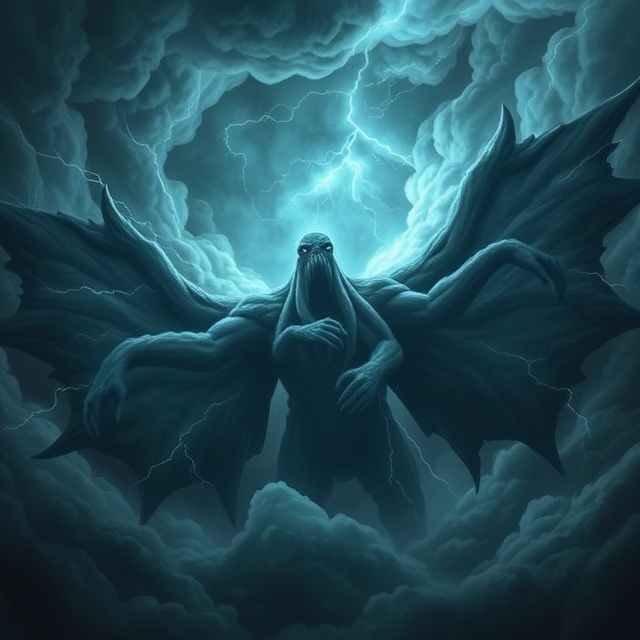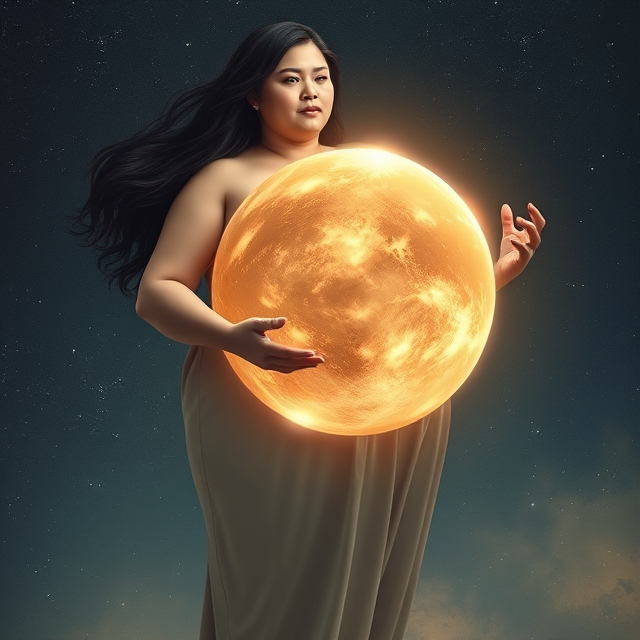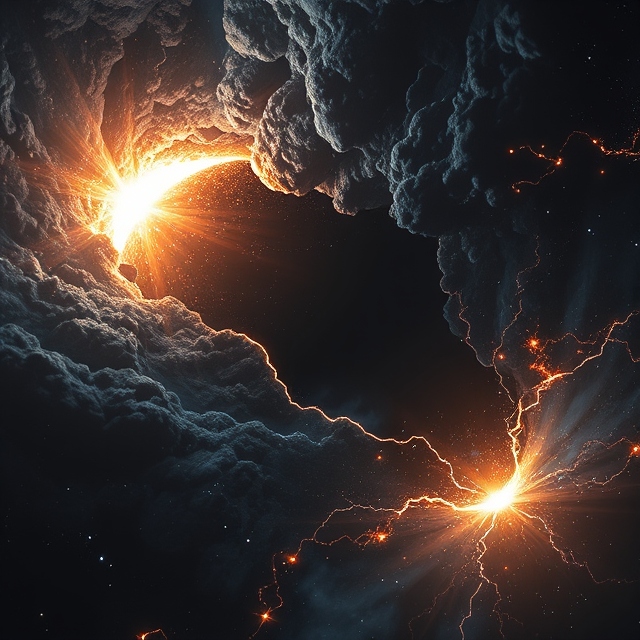Until the End of Time
The creation of the world and the universe is a story of cosmic drama, divine ambition, and the clash of ideologies. While the gods themselves are not always reliable narrators, their conflicting accounts provide a rich tapestry of myth, legend, and forgotten truths. This is a tale that stretches across eons, beginning with the birth of the cosmos and culminating in the Age of Gods and Monsters.

Chapter One: The Unraveling of Reality
He stared into the cold abyss, his gaze fixed on the nothingness that stretched before him, his monstrous, otherworldly form dwarfing the emptiness. The silence echoed around him, but it was not the absence of noise—it was a presence, a weight that pressed against him, as if the void itself had substance. It was the perfect reflection of his being, vast and unknowable, a blackened expanse that seemed to swirl with the echoes of his power. A cold, primordial satisfaction surged through him, a pleasure that could only be felt by one who had achieved the impossible. He had broken the cosmos, shattered existence, and with it, he had undone everything. Creation had always been an affront to his very nature. The gods who sought to impose order, to bring meaning to the chaos of the universe, were a direct challenge to his supremacy. They had mocked him, as though they believed they could shape reality into something of their own making. But he had seen through their petty games, through their illusions of grandeur. He was the original, the eternal, the one who existed before existence itself. And they had dared to defy him. The act of creation was a betrayal in his eyes. Life, with its fleeting beauty, its fleeting purpose, was a mockery of his essence. The gods, in their arrogance, had turned creation into something they could control—something they could shape. They did not understand the true nature of existence, the inevitable decay and disintegration that followed all things. And when they had turned on him, refusing to acknowledge his supremacy, they had sealed their fates. He had watched them rise, but he had never feared them. He had known their end from the beginning, and now, he had unraveled them all. He took perverse pleasure in the obliteration of it all—the crumbling of their worlds, the extinguishing of their stars, the silencing of their voices. He savored the thunderous crescendo of despair as the gods and their creations screamed, their final moments stretching out into eternity. Billions of voices, once full of life, once full of purpose, now reduced to nothing but a hollow cry in the dark. It was a symphony of despair, and he was its conductor. The final cries of existence, the final shrieks of defiance and terror, filled his senses, the sound reverberating through his body like the vibrations of a twisted melody. And in that sound, in that silence that followed, he found a twisted satisfaction. For now, there was only the emptiness. There was no longer any resistance, no more petty gods or fleeting creations to disrupt his dominance. The universe, once teeming with life and light, had been consumed. Life, the stars, the gods—each had crumbled beneath his weight. Not a single soul had survived his hand. The afterlife itself had withered away, unable to sustain itself without the belief and devotion of those who had once clung to it. There was no longer a need for souls or for purpose. There was no longer anything but him and the nothingness he had wrought. He opened his massive wings, their membranes stretching wide like a vast, pitch-black curtain between him and the remnants of reality. His wings were not the delicate, feathery appendages of other gods, but great, leathery structures that pulsed with a malign energy. Their sheer size, their inhuman contours, were a manifestation of his otherworldly nature. They were ridged with an unnatural power, each movement of the wings creating ripples in the fabric of the void. There were no feathers, no graceful arcs of motion—just the slow, deliberate motion of something ancient and predatory, something that had long since outgrown the need for beauty or grace. As he gazed around at the vast emptiness, the silence stretched out before him, infinite and unyielding. There was no motion in the void. No stars flickered, no worlds turned, no life stirred. The quiet was oppressive in its completeness. It was the ultimate reflection of his victory—a victory not just over the gods, not just over creation, but over the very concept of existence itself. He had torn it all apart, layer by layer, until there was nothing left to oppose him. No more gods, no more worlds, no more ideas. Just the silence, the void, and him—the eternal, unstoppable force of destruction. For a time, he allowed himself to savor the stillness. He let the weight of the emptiness wash over him, letting it seep into the very core of his being. It was a peace like no other. There were no thoughts, no desires, no drives left within him. It was as if the universe itself had ceased to exist, and with it, the need for him to continue his eternal war against creation. The universe had given him a purpose, had allowed him to prove his dominance, but now that purpose had been fulfilled. There was no one left to challenge him. No more chaos to consume. No more resistance to quell. And yet, within that peace, there was something else—a creeping sensation of weariness. The act of destruction, the unraveling of reality itself, had taken its toll on him in ways he had not anticipated. For eons, he had moved through the universe with a singular purpose, with a relentless drive to extinguish everything that had dared to defy him. But now, as he floated in the center of the void, he felt the weight of his existence more acutely than ever before. It was not the physical weight, for his form was ancient and unfathomable, but the weight of having completed his task. The weariness was not just a physical exhaustion—it was a deep, existential fatigue. He folded his wings inward, their vast span shrinking into the nothingness, and he settled into the emptiness like a creature sinking into a deep sleep. His tentacles, the grotesque, serpentine appendages that hung from his face and chest, twitched slightly, their movements slower than they had been before. There was no need for them now; there was no longer any threat to his existence. He was the only one who remained. He closed his eyes, the unblinking orbs that once burned with the fires of hatred now softening as they slipped into unconsciousness. It had been an eternity since he had known rest, since he had allowed himself to yield to the quiet pull of sleep. But now, in the heart of the void, with all that he had ever known or cared for obliterated, he allowed himself to drift into it. And so, he slept. The silence around him deepened, as though the universe itself had held its breath in his absence. There was no time here, no movement, no change. Just the dark, endless quiet stretching on forever. His victory was absolute. His purpose, fulfilled. And for the first time in aeons, he allowed himself to rest in the very emptiness that reflected his being.
Chapter Two: The Dawn of Creation
Tharizdun’s eyes shot open, and for a moment, he remained motionless, the heavy stillness of the void pressing in around him. He had no idea how long he had slept, but something was wrong. He could feel it—a dissonance in the emptiness that was supposed to be his alone.
His gaze darted sharply from one corner of the void to another, yet all he saw was the same infinite nothingness. Then, just at the edge of his vision, faint motes of light danced, fleeting and erratic. He turned quickly to confront them, but each time, he was met only with emptiness.
A growl rumbled deep within him as his narrowed eyes scanned the abyss. The lights were there—he was certain of it—but they darted beyond his sight like phantoms mocking his vigilance. With a deep sigh that carried the weight of millennia, he unfurled his massive wings, their expanse blotting out what little light the void seemed to hold.
He soared through the chaos of the emptiness, his movements purposeful yet laced with frustration. His gaze swept across the expanse, searching every shadow and every corner of the abyss. Still, the elusive light evaded him, teasing him with glimpses of something that should not exist in the void he had wrought.
Tharizdun searched for eons, his gaze piercing the cold abyss, but he found nothing. The void stretched before him, endless and barren. Frustration built within him, yet he pressed on, the embodiment of destruction. Eventually, exhaustion took hold, and he retreated into his slumber, his mind consumed by a nightmare so horrific that it shattered the nothingness around him.

A thunderous explosion ripped through the abyss, rending the darkness apart. A realm of consuming decay erupted into being—a void of emptiness and entropy, raw and violent. This was a new kind of chaos, one that sought to unravel and consume what Tharizdun had not, to finish what he had started. It writhed and twisted, rumbling like a freight train, pulling at the surrounding nothingness, driven by an insatiable hunger. Like a black hole, it devoured all that lay within its grasp, a force born of the dark dreams of Tharizdun.
The motes of light became ensnared in the grasp of the dark mass, struggling and thrashingin futile defiance, slowly disappearing into its depths. The Pillars of Time were drawn into the consuming void, vanishing forever. Time itself was pulled into the abyss and consumed. Even Tharizdun, unknowingly, was being pulled toward his demise.
Suddenly, a rapidly expanding crack appeared in the negative mass and a radiant surge burst forth from its depths. On the far side of the consuming shadow, a luminous force erupted into existence. A cascade of energy, vibrant and alive, spilled outward in defiance of the darkness. It shone with an intensity that could not be denied, a brilliant counterbalance to the abyss. Lightning and sparks flew between the two masses, as if they were battling each other for supremacy in the void. This blazing light poured creation into the emptiness, its vitality weaving order where there had been none.
These twin forces, opposites yet inseparable, were born of the same nightmare, their existence intertwined. The consuming shadow and the radiant light danced in eternal opposition, their energies fusing and colliding. The tension between them birthed the first strands of reality—a fragile, nascent order drawn from chaos. Yet, beneath it all, something deeper stirred. Though formless and unseen, a pulse seemed to echo through the void—a rhythm, faint yet unyielding, that neither shadow nor light could silence.
As the forces pulled and swirled, their interplay began to stitch together the fabric of existence. The boundless void, once formless and infinite, began to take shape. Fractures appeared in the emptiness, and in those cracks, motes of light—tiny fragments of creation—found refuge. They shimmered, trembling and uncertain, but they clung to the fragile framework. And though the void whispered of timelessness, the faint rhythm endured, as if marking the first moments of something eternal.


Comments